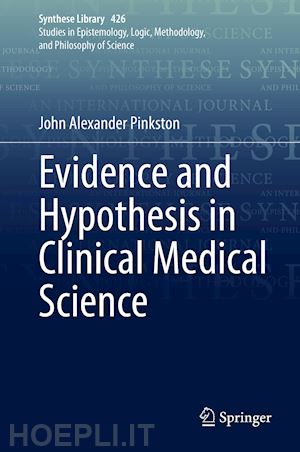
Questo prodotto usufruisce delle SPEDIZIONI GRATIS
selezionando l'opzione Corriere Veloce in fase di ordine.
Pagabile anche con Carta della cultura giovani e del merito, 18App Bonus Cultura e Carta del Docente
In this book, the author argues that no current philosophical theory of evidence in clinical medical science is adequate. None can accurately explain the way evidence is gathered and used to confirm hypotheses. To correct this, he proposes a new approach called the weight of evidence account. This innovative method supplies a satisfactory explanation and rationale for the “hierarchical pyramid” of evidence–based medicine, with randomized clinical trials and their derivatives, meta-analyses, and systematic reviews of randomized clinical trials at the top and case reports, case series, expert opinion, and the like at the bottom.
The author illustrates the development of various “levels” of evidence by considering the evolution of less invasive surgical treatments for early breast cancer. He shows that the weight of evidence account explains the notion of levels of evidence and other efforts to rank them. In addition, he presents a defense of randomization as a method to maximize accuracy in the conduct of clinical trials. The title also considers ethical issues surrounding experimentation with medical therapies in human subjects. It illustrates and discusses these issues in studies of respiratory therapies in neonates and treatment for certain cancers in adults. The author shows that in many cases sufficient evidence can be accrued to warrant generally accepted new therapies without the need for evidence derived from randomized clinical trials.1. Introduction
1.1 Aims and Motivation
1.2 Overview of the Following Chapters
References
2. Theories of Confirmation in which Hypotheses do not have Probabilities
2.1 Hypothetico-Deductivism
2.2 Hempel's "Satisfaction" Theory
2.3 Mayo's Error-Statistical Theory
References
3. Theories of Confirmation in which Hypotheses have Probabilities, and Inference to the Best Explanation
3.1 General
3.2 Bayesianism
3.3 Achinstein's Theory of Evidence
3.4 Inference to the Best Explanation3.4.1 What is an Explanation?
3.4.2 Evidence, Hypothesis, and Explanation in Clinical Medical Science
References
4. Confirmation of Hypotheses in Clinical Medical Science
4.1 General
4.2 Therapeutic Hypotheses
4.2.1 Controlled Trials
4.2.2 N of 1 Trials
4.3 Etiologic Hypotheses
4.3.1 Cohort Studies
4.3.2 Case-Control Studies
4.3.3 Cross-Sectional Studies
4.3.4 Remarks on the Challenges of Etiologic Research
4.4 Diagnostic Hypotheses
References
5. A Weight of Evidence Account
5.1 General
5.2 Some Threats to Accuracy
5.2.1 Selection Bias
5.2.2 Information Bias
5.2.3 Confounding5.3 How is the Weight of Evidence Determined?
5.3.1 Cochrane Systematic Reviews
5.3.2 IARC Reviews
5.4 How is the Weight of Evidence Quantified?
5.5 The Importance of Accuracy
References
6. The Weight of Evidence Account Defended
6.1 General
6.2 Current Theories of Evidence are Unsatisfactory for Clinical Medical Science
6.3 The Weight of Evidence Account Remedies Deficiencies in other Accounts
6.4 The Weight of Evidence Account Explains the Case Studies
6.5 The Weight of Evidence Account Explains Efforts to Rank Evidence
References7. Justification for the Hierarchical Pyramid of Evidence-Based Medicine and a Defense of Randomization
7.1 General
7.2 The Evolution of Treatments for Early Breast Cancer
7.2.1 Background
7.2.2 Early Studies
7.2.3 Controlled Trials in Clinical Medical Science Revisited
7.2.4 RCTs in Early Breast Cancer
7.3 Is Randomization Necessary?
7.4 A Defense of Randomization
7.5 Analysis of Evidence in Studies of Treatment for Early Breast Cancer
7.6 Some Issues in Generalizing the Results of RCTs in Clinical Medical Science
7.7 Why the Hierarchical Pyramid of EBM is Justified
References
8. Ethics and Evidence: Is Evidence from Randomized Controlled Trials Necessary to Firmly Establish a New Therapy?
8.1 General
8.2 ECMO
8.2.1 Background and RCTs of ECMO
8.2.2 Were the ECMO RCTs Necessary?
8.3 Carcinoma of the Anal Canal8.4 Disseminated Carcinoma of the Testis
8.5 Conclusions
References
Index











Il sito utilizza cookie ed altri strumenti di tracciamento che raccolgono informazioni dal dispositivo dell’utente. Oltre ai cookie tecnici ed analitici aggregati, strettamente necessari per il funzionamento di questo sito web, previo consenso dell’utente possono essere installati cookie di profilazione e marketing e cookie dei social media. Cliccando su “Accetto tutti i cookie” saranno attivate tutte le categorie di cookie. Per accettare solo deterninate categorie di cookie, cliccare invece su “Impostazioni cookie”. Chiudendo il banner o continuando a navigare saranno installati solo cookie tecnici. Per maggiori dettagli, consultare la Cookie Policy.